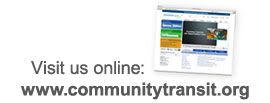Wednesday, May 18, 2011
Who Wants to Be a Millionaire?
By Mark Melnyk, Community Transit Transportation Demand Management Specialist
Since the point of working is to make money rather than spend money, I look for the most economical choices out there for my 20-mile commute. Well the usual suspects are taking the bus, joining a carpool or vanpool.
However, I don’t want to have to depend on other people to get from one place to another. This wouldn’t be so bad if I didn’t have an unusual schedule that makes it difficult for me to commit to a consistent schedule.
To be able to take one bus from where I live to where I work would be fantastic. Unfortunately, I’m left with a bus ride that leaves me short of my final destination. It seems that the only viable option I have is driving myself to work. But like I said, the point of my commute is to take me to a job to make money, not spend money on things like gas getting to work.
So what can I do to have the same freedom that comes with driving my car, and the cost savings that come with riding the bus?
The answer I found is riding my bike. Not the full 20 plus miles.
Since the point of working is to make money rather than spend money, I look for the most economical choices out there for my 20-mile commute. Well the usual suspects are taking the bus, joining a carpool or vanpool.
However, I don’t want to have to depend on other people to get from one place to another. This wouldn’t be so bad if I didn’t have an unusual schedule that makes it difficult for me to commit to a consistent schedule.
To be able to take one bus from where I live to where I work would be fantastic. Unfortunately, I’m left with a bus ride that leaves me short of my final destination. It seems that the only viable option I have is driving myself to work. But like I said, the point of my commute is to take me to a job to make money, not spend money on things like gas getting to work.
So what can I do to have the same freedom that comes with driving my car, and the cost savings that come with riding the bus?
The answer I found is riding my bike. Not the full 20 plus miles.
Tuesday, May 17, 2011
Bike to Work Day Ditty
By Margaret Elwood, Guest Poet
Margaret uses Swift and her bicycle year-round to commute to work at Snohomish County PUD. She is a member of the "PUDlers" team in the Bike Commute Challenge presented by B.I.K.E.S. Club of Snohomish County.
Take the Challenge! Cycling's cool.
Bike to work or bike to school.
Savvy cyclists think alike:
Take a bus ride with your bike.
Save some money - that's a perk.
Go get healthy: Bike To Work!
Bike to Work Day is May 20 and you can sign up for the Bike Commute Challenge through June 3.
Enjoy another of Margaret's poems here.
Margaret uses Swift and her bicycle year-round to commute to work at Snohomish County PUD. She is a member of the "PUDlers" team in the Bike Commute Challenge presented by B.I.K.E.S. Club of Snohomish County.
Take the Challenge! Cycling's cool.
Bike to work or bike to school.
Savvy cyclists think alike:
Take a bus ride with your bike.
Save some money - that's a perk.
Go get healthy: Bike To Work!
Bike to Work Day is May 20 and you can sign up for the Bike Commute Challenge through June 3.
Enjoy another of Margaret's poems here.
Friday, May 13, 2011
Transit Honored for Traffic Safety Contributions
The Snohomish County DUI and Target Zero Traffic Safety Task Force recently held its annual awards ceremony, recognizing law enforcement, youth, businesses and individuals who contributed to traffic safety in 2010.
Community Transit’s coach operators were among those honored as “Community Champions.”
Keeping our passengers and the roads of Snohomish County safe is the most important part of the job of being a Community Transit bus driver.
Of the agency’s more than 300 coach operators, 73 have received a Million Mile Safe Driving Award from the National Safety Council, representing 12 years of professional driving without a preventable accident.
In addition to being safe drivers themselves, Community Transit coach operators help keep our roads safe by providing an alternative means of transportation for people who have lost their driving privileges. Public transportation ensures that people who have lost their license do not also lose their ability to get to jobs, treatment and other resources.
Community Transit Coach Operator of the Year Al Mehau accepted the award on behalf of his colleagues, along with Community Transit Coach Operator Instructor Inder Sharma.
Community Transit’s coach operators were among those honored as “Community Champions.”
Keeping our passengers and the roads of Snohomish County safe is the most important part of the job of being a Community Transit bus driver.
Of the agency’s more than 300 coach operators, 73 have received a Million Mile Safe Driving Award from the National Safety Council, representing 12 years of professional driving without a preventable accident.
In addition to being safe drivers themselves, Community Transit coach operators help keep our roads safe by providing an alternative means of transportation for people who have lost their driving privileges. Public transportation ensures that people who have lost their license do not also lose their ability to get to jobs, treatment and other resources.
Community Transit Coach Operator of the Year Al Mehau accepted the award on behalf of his colleagues, along with Community Transit Coach Operator Instructor Inder Sharma.
Tuesday, May 3, 2011
High Fuel Prices Cost Transit, Too
By Dave Richards, Community Transit Director of Maintenance
High gas prices are causing individuals to cut back on their driving to save money.
How do fuel costs affect transit budgets?
For every one cent rise in diesel prices, we have an increase in operating costs of more than $31,000 per year. That is just for our fixed route buses. Fuel costs for our automobiles, DART paratransit service and vanpools increase as well.
Fuel, whether it is diesel or gasoline, is an expensive and necessary commodity in the public transportation business. We can’t just suddenly stop serving the customers who rely on us to do the driving for them. That doesn’t mean we can’t take actions to reduce the effects that fuel costs and fuel usage have on our ability to operate efficiently.
High gas prices are causing individuals to cut back on their driving to save money.
How do fuel costs affect transit budgets?
For every one cent rise in diesel prices, we have an increase in operating costs of more than $31,000 per year. That is just for our fixed route buses. Fuel costs for our automobiles, DART paratransit service and vanpools increase as well.
Fuel, whether it is diesel or gasoline, is an expensive and necessary commodity in the public transportation business. We can’t just suddenly stop serving the customers who rely on us to do the driving for them. That doesn’t mean we can’t take actions to reduce the effects that fuel costs and fuel usage have on our ability to operate efficiently.
Subscribe to:
Comments (Atom)





